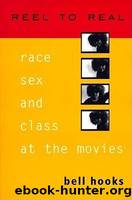Reel to Real: Race, Sex, and Class at the Movies by Hooks Bell

Author:Hooks, Bell [Hooks, Bell]
Language: eng
Format: epub
Tags: feminism
ISBN: 9780415918244
Amazon: 0415918243
Goodreads: 681868
Publisher: Routledge
Published: 1996-11-22T08:00:00+00:00
15
THE CULTURAL MIX: AN
INTERVIEW WITH
WAYNE WANG
The Buddhist concept of âmaitriâ is translated as loving kindness by many teachers here in the West. In The Wisdom of No Escape, Pema Chodron shares that we are here to study ourselves, to live in a spirit of wakefulness. To that end we need to be curious and inquisitive, alive and open, and it is that path that will lead us to âthe fruition of maitri-playfulness.â
Her words resonate in my mind as I think about the unique magical aspects of Wayne Wangâs work. All his early filmsâ
Chan is Missing, Dim Sumâand the more recent Hollywood filmsâ The Joy Luck Club, Smoke, Blue in the Faceâreveal a passion for ordinary detail, the dailiness of life. Wangâs work is not documentary realism, instead he works to capture the meditative spirit of stillness and reflection that is often present in all our lives but goes unnoticed. He takes the fascination with small details, ordinary tasks that hint at a larger
156
r e e l t o r e a l
metaphysics. It is easy to see why the narrative of Smoke would intrigue him.
Working in enclosed space, without directing a great deal of attention to a large environmental context, Smoke reminds us of the way in which our lives are shaped and circumscribed by landscapes over which we have very little control. Wang juxtaposes those environments with the inner landscapeâthat place in the self where we can imagine and thus invent and reinvent ourselves. This spirit of tenderness is awesomely present in Blue in the Face, and is personified in the characters of Jimmy Rose (Jared Harris), who is a mixture of late bloomer, idiot savant, lovable âretardâ; the Rapper (Malik Yoba) who is a combination scammer, street hustler, and philosopher; in the passionate and poetic longing of Violet (Mel Gorham), who desires fulfillment in love and cannot find it; and in Dot (a really powerful moving performance by Roseanne). In Blue in the Face, Wang teases out the complex inner layers of the psyche in a way that is marvelous.
This sense of magical complexity and the possibility of playful serendipity, of the beauty in the ordinary, is precisely what is not present in Smoke. When I first read the screenplay of Smoke I found it such a moving narrative. The storyâs insistence that we can never really âjudgeâ another person because we do not know enough about the path that they have walked is a powerful intervention in a culture where we are socialized to judge by appearances. And Wangâs decision to give racial diversity and identification to the characters, when this was not present in the original story, was all the more compelling. Evil cannot simply be designated as a characteristic of one group, and that which appears to be a lawless act might have a positive outcome. But when I saw Smoke, I was stunned by the way in which all the usual racial and sexual stereotypes are played out: the good guys are white, the bad guys black, loose women are working class or females of color, and on and on .
Download
This site does not store any files on its server. We only index and link to content provided by other sites. Please contact the content providers to delete copyright contents if any and email us, we'll remove relevant links or contents immediately.
Cecilia; Or, Memoirs of an Heiress — Volume 1 by Fanny Burney(32548)
Cecilia; Or, Memoirs of an Heiress — Volume 2 by Fanny Burney(31947)
Cecilia; Or, Memoirs of an Heiress — Volume 3 by Fanny Burney(31932)
The Great Music City by Andrea Baker(31917)
We're Going to Need More Wine by Gabrielle Union(19035)
All the Missing Girls by Megan Miranda(15962)
Pimp by Iceberg Slim(14489)
Bombshells: Glamour Girls of a Lifetime by Sullivan Steve(14058)
For the Love of Europe by Rick Steves(13933)
Talking to Strangers by Malcolm Gladwell(13350)
Norse Mythology by Gaiman Neil(13349)
Fifty Shades Freed by E L James(13233)
Mindhunter: Inside the FBI's Elite Serial Crime Unit by John E. Douglas & Mark Olshaker(9324)
Crazy Rich Asians by Kevin Kwan(9280)
The Lost Art of Listening by Michael P. Nichols(7494)
Enlightenment Now: The Case for Reason, Science, Humanism, and Progress by Steven Pinker(7306)
The Four Agreements by Don Miguel Ruiz(6745)
Bad Blood by John Carreyrou(6611)
Weapons of Math Destruction by Cathy O'Neil(6267)
